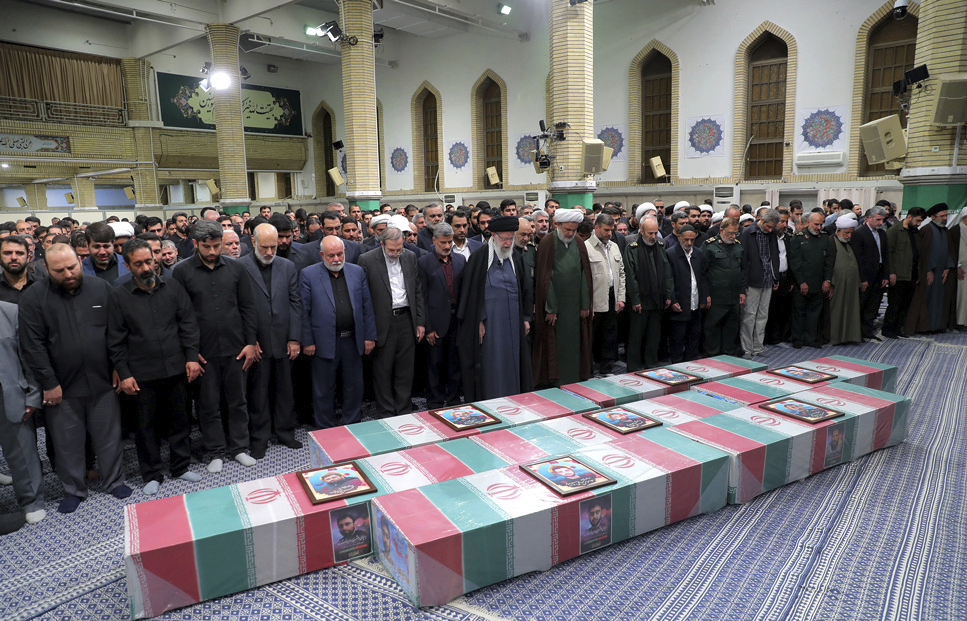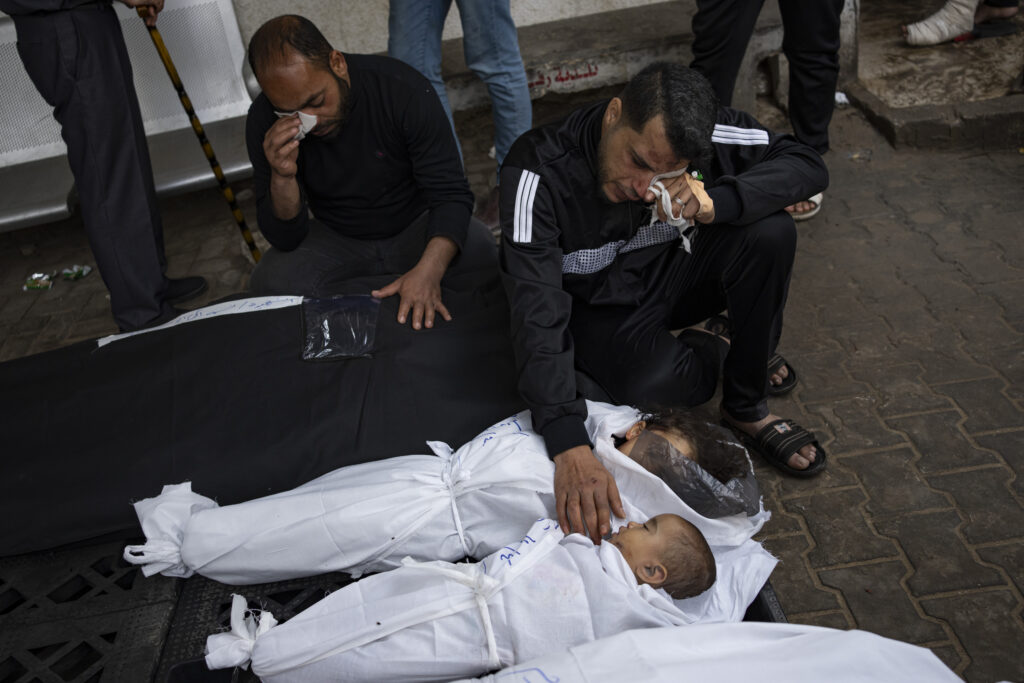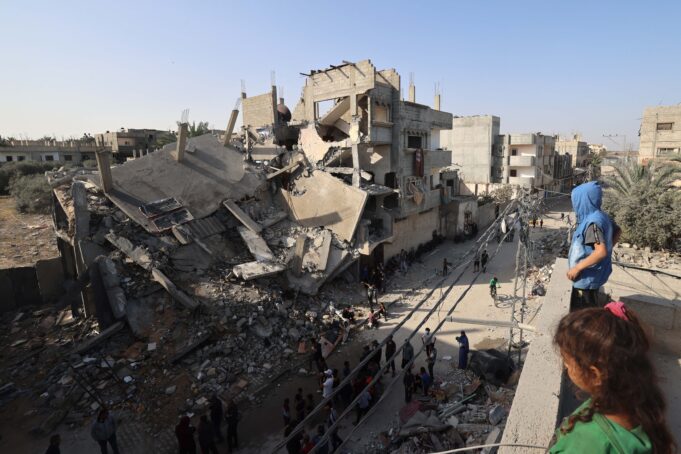Israel’s brutal war on Palestinians under the guise of eradicating the resistance group Hamas is exceeding the limits. Among the more than 33,000 Palestinians slaughtered since October 7, 2023, are also the slain lives of humanitarian workers and other individuals protected under international and humanitarian law.
World Central Kitchen workers were killed in Deir al-Balah, Gaza Strip, April 2 by an Israeli strike as the volunteers were delivering much-needed aid and supplies to Gaza. The strike killed seven aid workers.
Despite a United Nations “immediate ceasefire” resolution and legal orders from the World Court concerning civilian lives, Israel is bent on war, say observers.
In addition to flouting international pressure and legal boundaries, the Zionist state has escalated bloodshed beyond its borders with a brazen missile attack on the embassy of the Islamic Republic of Iran in Damascus, Syria. The April 1 move heightened rhetoric and fears of an expanded war in the Middle East.
As war worsens, pressure is also mounting on Israel’s military and financial backer, the United States. Under growing pressure, President Joe Biden called Israeli Prime Minister Benjamin Netanyahu over his frustration with Israel’s war conduct.
“President Biden emphasized that the strikes on humanitarian workers and the overall humanitarian situation are unacceptable,” said a White House statement after the April 4 call.
“He made clear the need for Israel to announce and implement a series of specific, concrete, and measurable steps to address civilian harm, humanitarian suffering, and the safety of aid workers,” said the statement.
Mr. Biden told the Israeli leader that U.S. policy concerning Gaza will be determined by an assessment of Israel’s “immediate action” on those steps. He also said an “immediate ceasefire is essential” to stabilize and improve the humanitarian situation and protect innocent civilians.
“If we don’t see the changes we need to see, there will be changes in our policy,” said U.S. Secretary of State Antony Blinken.
However, the question is, will Mr. Netanyahu, who is usually defiant of international pressure, comply with Mr. Biden’s demands?
As Mr. Biden and Mr. Blinken issue stronger talk than usual with Israel, replete with unnamed “policy” changes if noncompliant, U.S. weapons transfers and sales are still in play. The nearly $4 billion annual check to Israel remains on the table.
Mr. Biden is expected to sign off on an $18 billion sale of fighter jets to Israel and the administration recently authorized the transfer of over 1,000 five-hundred-pound bombs and over 1,000 small-diameter bombs, according to media reports.
Moreover, demands for an arms embargo on Israel are growing. In a letter to Mr. Biden and Mr. Blinken, more than 30 House Democrats called for a complete pause on weapons transfers to Israel.
“In light of the recent strike against aid workers and the ever-worsening humanitarian crisis, we believe it is unjustifiable to approve these weapons transfers,” read the April 5 letter, signed also by ex-Speaker and Biden ally, Nancy Pelosi.
On April 5, the United Nations Human Rights Council called upon all States to stop the sale, transfer and diversion of arms, munitions, and other military equipment to Israel. Additionally, an April 4 letter issued by The Elders, a group of 12 global rights leaders, founded by Nelson Mandela in 2007 and chaired by former President of Ireland Mary Robinson, agreed with the sentiment.

“As Israel’s closest ally and its largest provider of arms, the United States of America must lead the way,” The Elders said in a statement.
“We are deeply concerned that the Biden administration continues to approve arms transfers, appearing to accept Israel’s assurances on compliance with its legal obligations as credible, despite overwhelming evidence to the contrary.”
Citing concerns of “complicity in grave breaches of international law,” by the United Kingdom, over 1,000 legal experts, academics and former members of the judiciary co-signed a letter to Prime Minister Rishi Sunak, demanding Britain axe its provision of weapons and weapons systems to Israel. A similar letter was sent to President Emmanuel Macron by legal experts in France.
The situation for the Palestinians also continues to deteriorate as famine is gripping the population. Additionally, Al Jazeera reports that Israel is also currently detaining 200 Palestinian children, according to a Prisoners Rights Group.
“The Palestinian Prisoners Society says that 23 of the children are from the Gaza Strip, and they are being held in Megiddo, in northern Israel. The organization released its statement on Palestinian Children’s Day, which is being marked on April 5,” Al Jazeera reported.
“This is the bloodiest year against Palestinian children, with more than 14,000 killed in Gaza in the last six months, in addition to the 117 killed by Israeli forces in the occupied West Bank, including East Jerusalem.” Since October 7, Israeli troops have also detained more than 500 children in the West Bank, “after which they are subject to unfair, unjust trials in military courts,” the organization said, the outlet continued.
On Iran, the White House statement said Mr. Biden made clear that the United States strongly supports Israel in the face of threats, resulting from Israel’s missile attack.
The Zionist state ignited a major fuse when it committed air strikes on the Iranian embassy. The deadly attack leveled the consulate section of the compound and killed 13 people.
Among the dead was General Mohammad Reza Zahedi, who led Iran’s elite Revolutionary Guard Quds Force (IRGC) in Lebanon and Syria, and his number two, General Mohammad Hadi Haji Rahimi. The two senior military leaders were on an advisory mission in Syria along with five other officers.
Their deaths were the latest in a string of assassinations targeting Iranian officials, scientists and military leaders blamed on Israel, notably following the U.S. targeted killing of IRGC General Qassem Soleimani in 2020 in Iraq. In an already explosive region centered on Israel’s Gaza war, Iranian leaders vowed retribution for the aggression.
“The cowardly efforts by the Zionist regime like the one they carried out in Syria will not save them from defeat. They will of course receive a slap in the face for this move,” vowed Iranian Supreme Leader Ayatollah Ali Khamenei.
“The Zionist regime’s defeat in Gaza will continue, and this regime will approach demise and collapse,” warned Ayatollah Khamenei. The bombing exacerbated worsening tensions between Tehran and Tel Aviv. In this case it is more dangerous because according to international law, embassies are sovereign territories. Attacking them is tantamount to an act of war, said analysts.
“Israel has been keen from the outset to seek to draw Iran directly into this conflict, in the hope that with the unlimited and unconditional support it’s receiving from the United States, that it could somehow engineer a direct U.S.- Iranian confrontation,” said Mouin Rabbani, senior fellow at the Institute for Palestine Studies.

“The problem for Iran is that it has so far not responded directly to these Israeli escalations and provocations, and Israel may, on this occasion, found the mechanism which is going to make it impossible for Iran to continue ignoring Israel because this is an attack on sovereign Iranian territory,” explained Mr. Rabbani. “It breaks every conceivable rule in the book,” he added.
Bombing the consulate is part of a long record of Israeli provocation. For years Israel and America actively campaigned governments in the region to isolate Tehran and form an anti-Iran coalition of belligerents. However, with the unprecedented carnage in Gaza, it is Israel and America experiencing isolation.
In an emergency meeting of the UN Security Council on April 2, the Iranian deputy ambassador to the UN laid the responsibility for Israel’s illegal aggressions on the U.S.
Iran “has exercised considerable restraint, but it is imperative to acknowledge there are limits to such forbearance,” said Ambassador Zahra Ershadi. “The occupying regime must bear full responsibility for its consequences,” she added. In words directed at the U.S., Ms. Ershadi said Tehran holds Washington “responsible for all crimes committed by the Israeli regime.”
She lambasted the U.S. for blocking ceasefire resolutions for six months; for destabilizing Syria and the region; and continuing its unpopular support of Israel’s war in Gaza, now spreading. In Syria and Lebanon, Israel has been trading fire with Hezbollah and Islamic Jehad, fighting in solidarity with Hamas in an “axis of resistance.”
Ms. Ershadi pointed out that targeting the Iranian embassy breached the fundamental principle of diplomatic and consular immunity and flagrantly violated the 1961 Convention on Diplomatic Relations, the 1963 Vienna Convention on Consular Relations, and the Convention on the Prevention and Punishment of Crimes Against Internationally Protected Persons, including Diplomatic Agents of 1973.
The embassy strike was days after Israeli air strikes killed more than 40 people in Syria’s northern province of Aleppo.
Khaled Khiari, UN Assistant Secretary-General for the Middle East, Asia and the Pacific, told the UNSC there were increased attacks in Syria. “Among them, increasingly lethal attacks on Iran-linked targets in Syria have been attributed to Israel, especially since the current conflict with Hamas in Gaza began on October 7. Open sources have reported at least a dozen such attacks since the beginning of this year,” said Mr. Khiari.
“While Israel has rarely claimed responsibility for any of these incidents, its officials have repeatedly acknowledged its military operations in Syria and have suggested that more such operations will occur in the future,” he added, underlining the need for the council’s continued engagement.
He warned any miscalculation could trigger broader conflict in an already volatile region, with devastating consequences for civilians already suffering in Syria, Lebanon, the Occupied Palestinian Territory, and the broader Middle East.
During a roll call of statements from the diplomats to condemn the attacks, representatives from the U.S., Britain, and France, particularly called on Iran and its “proxies” not to exacerbate regional tensions. Despite the U.S. being Israel’s chief enabler and facilitator, the U.S. quickly distanced itself from any involvement in the act, saying there was no foreknowledge about it.
Covering Israel, the three Western nations blocked a draft Security Council press statement authored by Russia.
Swift condemnation of the Zionist State for the aggression came from various quarters worldwide rejecting the move as another notch in the belt toward broader war. Some observers say Israel is intent on dragging the region into significant escalation but warned it would plunge the world into a bloodbath and unbearable disaster.
The Honorable Minister Louis Farrakhan and his teacher, the Most Honorable Elijah Muhammad of the Nation of Islam, using scripture, warned the region is positioned for war. Both men said America is coming out of the Near East, and this means bloodshed and plenty of it.
“America is not going to stay in the Middle East. And I have to tell you, Israel won’t remain there either,” Minister Farrakhan said, quoting his teacher.
In his Saviours’ Day message delivered Feb. 25 titled, “What Does Allah The Great Mahdi and The Great Messiah Have to Say About the War in the Middle East,” the Minister explained: “In the Near East, there stand navies which are neither American nor British … they are there to drive America out. The skies over there are beginning to thicken with foreign planes carrying deadly weapons, guns and bombs.
“They will not be satisfied as long as Israel is in Palestine. The boil has come to a bursting point. We are in a troubled world, and we are in a world that is now erupting,” said Min. Farrakhan. “There are navies over there now that are not American nor British. China has warships over there now; she will be joined with others soon. Have you read in the scriptures (Luke 21:20): ‘When Jerusalem is compassed, surrounded with armies, know that the desolation is come?’”
Some observers noted the timing of Israel’s attack on the embassy was in the face of global pressure for a ceasefire and Security Council Resolution 2728, voted on March 25, demanding the same. It indicates a deliberate disregard for international demand.
Mr. Rabbani reasoned if Israel’s Western allies look the other way and do not provide Iran any satisfaction in addressing the provocation, then Iran must consider the consequences if it doesn’t respond. Then, “it’s basically open season on Iran by Israel,” he said.
“I’d be very surprised if Iran let’s this pass in peace,” said Mr. Rabbani.













